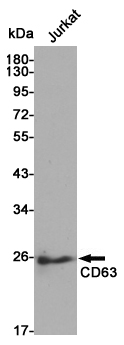
| WB | 咨询技术 | Human,Mouse,Rat |
| IF | 咨询技术 | Human,Mouse,Rat |
| IHC | 1/50-1/100 | Human,Mouse,Rat |
| ICC | 1/50-1/200 | Human,Mouse,Rat |
| FCM | 咨询技术 | Human,Mouse,Rat |
| Elisa | 1/10000 | Human,Mouse,Rat |
| Aliases | CD63; MLA1; TSPAN30; CD63 antigen; Granulophysin; Lysosomal-associated membrane protein 3; LAMP-3; Melanoma-associated antigen ME491; OMA81H; Ocular melanoma-associated antigen; Tetraspanin-30; Tspan-30; CD antigen CD63 |
| Entrez GeneID | 967 |
| WB Predicted band size | Calculated MW: 26 kDa; Observed MW: 26 kDa |
| Host/Isotype | Rabbit IgG |
| Antibody Type | Primary antibody |
| Storage | Store at 4°C short term. Aliquot and store at -20°C long term. Avoid freeze/thaw cycles. |
| Species Reactivity | Human |
| Immunogen | The antiserum was produced against synthesized peptide derived from the Internal region of human CD63. AA range:121-170 |
| Formulation | Purified antibody in PBS with 0.05% sodium azide,0.5%BSA and 50% glycerol. |
+ +
以下是3篇与CD63抗体相关的研究文献及其简要摘要:
---
1. **文献名称**:*Isolation and characterization of exosomes from cell culture supernatants and biological fluids*
**作者**:Théry C, Amigorena S, Raposo G, et al.
**摘要**:该文章系统描述了外泌体分离和鉴定的标准化方法,强调CD63作为外泌体表面标志物的重要性,并提供了基于CD63抗体的免疫印迹和流式检测技术用于外泌体表征。
---
2. **文献名称**:*Proteomic comparison defines novel markers to characterize heterogeneous populations of extracellular vesicle subtypes*
**作者**:Kowal J, Arras G, Colombo M, et al.
**摘要**:研究通过蛋白质组学分析不同细胞来源的细胞外囊泡亚型,发现CD63抗体可特异性标记外泌体,并验证其在不同疾病模型中作为外泌体富集标志物的可靠性。
---
3. **文献名称**:*The tetraspanin CD63 regulates ESCRT-independent and -dependent endosomal sorting during melanogenesis*
**作者**:van Niel G, Charrin S, Simoes S, et al.
**摘要**:本文揭示了CD63在黑色素细胞中调控内体分选和囊泡运输的机制,通过CD63抗体的功能阻断实验,证明其参与ESCRT依赖和非依赖途径,影响外泌体释放及细胞通讯。
---
以上文献为CD63抗体在外泌体研究和细胞生物学中的关键应用提供了理论和实验依据。
CD63 antibody is a research tool targeting the CD63 protein, a member of the tetraspanin family. CD63. also known as lysosome-associated membrane glycoprotein 3 (LAMP-3), is a transmembrane protein with four membrane-spanning domains, widely expressed in platelets, leukocytes, endothelial cells, and secretory vesicles. It plays roles in cell adhesion, signal transduction, and intracellular trafficking, particularly in lysosomes and late endosomes. CD63 is notably enriched on exosomes, making it a common exosome marker.
CD63 antibodies are widely used to study exosome isolation, cellular trafficking, and membrane dynamics. They facilitate detection via techniques like flow cytometry, immunofluorescence, Western blotting, and immunohistochemistry. In research, CD63 antibodies help investigate pathological processes, including cancer metastasis, immune responses, and neurodegenerative diseases, as CD63 interacts with integrins, receptors, and other tetraspanins to modulate cell migration, invasion, and signaling.
Additionally, CD63 antibodies are employed in diagnostic assays and therapeutic development, given their role in exosome-related intercellular communication and disease biomarkers. Variations in CD63 expression are linked to cancer progression, immune disorders, and lysosomal storage diseases, underscoring its clinical relevance. As a versatile tool, CD63 antibody remains pivotal in elucidating cellular mechanisms and potential therapeutic targets.
×